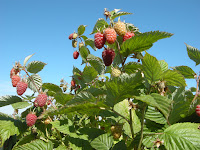The berries reveal themselves, each in their own way. To the picker, to the sun, to the bumblebee in search of flowers to visit. It's as if they understand the purpose of their existence -- that they were made to be eaten and enjoyed.
The darkest, deepest red of the berries let go of their branches at the slightest touch. Those paler or slightly orange cling tightly and won't allow themselves to be plucked, teaching perhaps that resistance is not, as the Borg would say, futile.
 Some lie hidden, gathered in a clutch beneath a canopy of green leaves, as if in wait for the one who will seek them out, perhaps the one who will best appreciate them.
Some lie hidden, gathered in a clutch beneath a canopy of green leaves, as if in wait for the one who will seek them out, perhaps the one who will best appreciate them.Still others push forward -- higher, higher on the branch -- standing tallest at the top of the spindliest part of the cane, maybe as if to be nearer the sun.
Already, so many berries have gone into my bucket this year. So many of those have in turn gone into bags now filling the freezer. Others have gone into jars of jam that will in turn become gifts at Christmastime.
The strawberries have come and been. Blueberries are next (tomorrow, first pick for me).
 But wait a minute, what's that already ripening even though it's still June? Blackberries aren't supposed to ripen until August, are they?
But wait a minute, what's that already ripening even though it's still June? Blackberries aren't supposed to ripen until August, are they?

2 comments:
Poetry! BTW could you hear the berries screaming as you boiled them in hot syrup? (I wonder if I've gone a little dong since that panel on how nature speaks to us - I talk to the green worms in broccoli, and the hummingbirds, and everybody's dog that barks when I go for a walk.)
No screaming came through, though clearly I got some kind of communicative vibe from them.
And there's nothing wrong with talking to worms or birds or dogs. All of them are part of our world, our community. Mostly, I think, we fail to understand their language.
Post a Comment